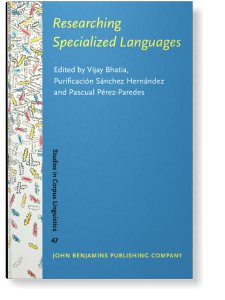Category: specialiized languages
Researching Specialized Languages wins research award
CFP AELFE 2014 : Academic communication in a digital age
12-14 June 2014, Stockholm University
This conference will draw connections between new publication practices, changing language uses, and new genres of academic communication. Today academics are under increasing pressure to disseminate their research results through high-impact outlets such as peer-reviewed journals. At the same time, new channels for knowledge transmission and exchange have emerged, often resorting to multimodal modes, and new genres have appeared in academic publishing domains. In the context of growing demands for accountability, transparency, and open access to data and publications, digital media offer improved ways of access to e-publications and alternative ways to fast publicity and open discussion. For international research communities and top-prestige publications, English takes the lion’s share. For outreach, local languages seem to be the most appropriate. Yet digital media mixes these assumptions, because local languages are often used along with English in various ways. Digital media also stir traditional assumptions about language editing and language norms in English.
Confirmed plenary speakers are:
Anna Mauranen, “Genre and register in research blogging”
Gibson Ferguson, “On linguistic justice in a digital age: the case of English in academia”
Carmen Pérez-Llantada, “Research genres and the growth of techno-dependency: intersections and implications”
We invite contributions exploring different aspects of academic communication in a digital age in order to acquire a better understanding of language uses in the academy and the role of LSP professionals in this changing sociopolitical context. This year’s conference will focus exclusively on the announced theme and will not include parallel sessions. A number of selected conference papers will be published in a peer-reviewed outlet. In addition, a number of poster presentations related to the traditional AELFE panels will be considered for inclusion in the conference programme. All conference presentations will be invited for publication in online proceedings edited by the conference organisers.
Please email your proposal (350 words) specifying whether it is a paper presentation or a poster to the Organising committee at aelfe2014@english.su.se
CFP AELFE 2014 : Academic communication in a digital age
12-14 June 2014, Stockholm University
This conference will draw connections between new publication practices, changing language uses, and new genres of academic communication. Today academics are under increasing pressure to disseminate their research results through high-impact outlets such as peer-reviewed journals. At the same time, new channels for knowledge transmission and exchange have emerged, often resorting to multimodal modes, and new genres have appeared in academic publishing domains. In the context of growing demands for accountability, transparency, and open access to data and publications, digital media offer improved ways of access to e-publications and alternative ways to fast publicity and open discussion. For international research communities and top-prestige publications, English takes the lion’s share. For outreach, local languages seem to be the most appropriate. Yet digital media mixes these assumptions, because local languages are often used along with English in various ways. Digital media also stir traditional assumptions about language editing and language norms in English.
Confirmed plenary speakers are:
Anna Mauranen, “Genre and register in research blogging”
Gibson Ferguson, “On linguistic justice in a digital age: the case of English in academia”
Carmen Pérez-Llantada, “Research genres and the growth of techno-dependency: intersections and implications”
We invite contributions exploring different aspects of academic communication in a digital age in order to acquire a better understanding of language uses in the academy and the role of LSP professionals in this changing sociopolitical context. This year’s conference will focus exclusively on the announced theme and will not include parallel sessions. A number of selected conference papers will be published in a peer-reviewed outlet. In addition, a number of poster presentations related to the traditional AELFE panels will be considered for inclusion in the conference programme. All conference presentations will be invited for publication in online proceedings edited by the conference organisers.
Please email your proposal (350 words) specifying whether it is a paper presentation or a poster to the Organising committee at aelfe2014@english.su.se


